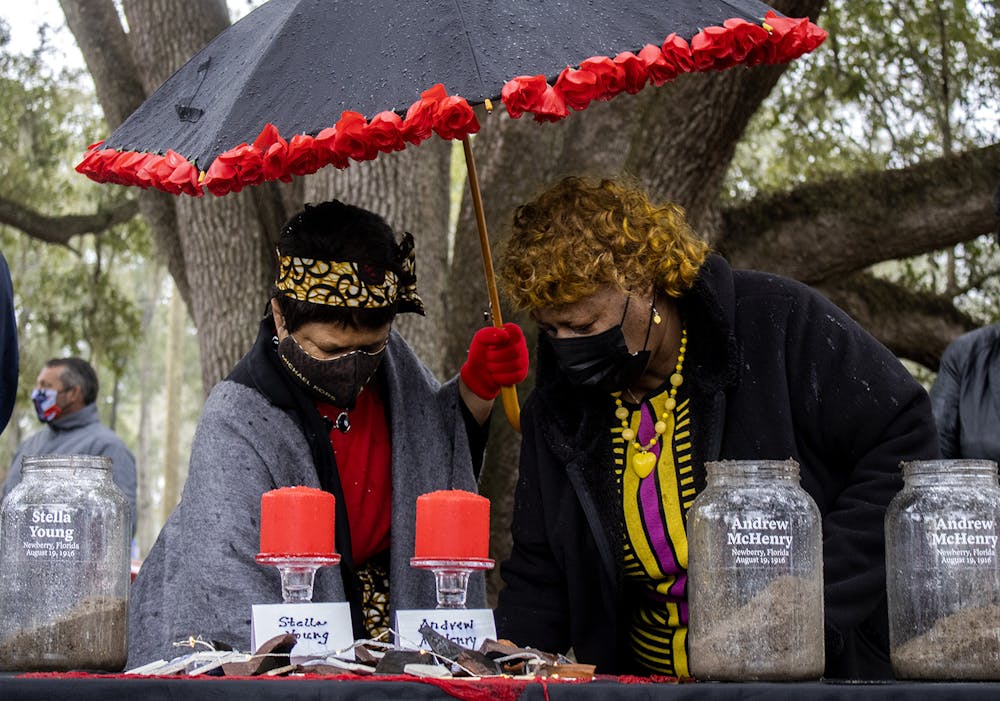On the cold, cloudy Friday morning, more than 50 people gathered to pay tribute to the Newberry Six — victims of a 1916 lynching — in a soil collection ceremony held beneath an old tree’s twisting branches at a grassy lot in Newberry.
The area is known as Lynch Hammock, where residents Jim Dennis, Bert Dennis, Mary Dennis, Stella Young, Andrew McHenry and Rev. Josh Baskins were reportedly murdered more than 100 years ago.
The Concerned Citizens of Newberry, a community organization, worked with the Equal Justice Initiative (EJI) from Montgomery, Alabama, the Alachua County Community Remembrance Project and the Real Rosewood Foundation, an organization dedicated to keeping the memory of Rosewood, Florida, alive, to hold the service.
Jackie Davis, a member of the county Remembrance Project, said the poured soil represents the labor of the victims and enslaved Africans who were brought to the United States.
“Their blood, sweat and tears have become part of our soil,” Davis said. “So we see the soil as a mute witness to these murders that occurred.”
Research on the Alachua County’s lynchings from EJI and the county’s historical commission led to the Truth and Reconciliation project the commission set in motion in 2018. The soil ceremony, originally planned for April 2020, is a step in the county’s path to address and reconcile with its history of racial violence. Lynchings are defined as unlawful murder, which includes hanging, drowning, shooting and burning sometimes as a public execution.
Candle flames flickered in the drizzle but remained lit as they sat in front of 13 empty jars. Six of the jars will return to Montgomery, and the rest will remain in Newberry. One jar read “unknown” for the countless unnamed victims of lynching in the U.S. The others displayed the names of those murdered during the public lynching in front of 200 Alachua County residents.
Pastor and Newberry-native Lewis King opened the service with a prayer.
“I just want you to imagine for a moment that right now, God is crying,” he said. “He’s weeping as a result of people coming together and saying that we will reconcile.”
The soil collection began after remarks from Newberry resident Brenda Whitfield and EJI representative Keiana West, a proclamation from the mayor and a tribute to former UF adjunct professor Patricia Hilliard-Nunn – whose work on lynching history, speakers said, made the event possible.
Attendees, including county commissioners and Sheriff Clovis Watson, watched as descendants of the six and other volunteers filled the jars with soil. The sound of “Amazing Grace” momentarily drowned out the rain.
Sheriff Watson stood with the crowd, clad in a suit and shielded by a green umbrella. As someone whose role is to ensure everyone’s fair and equal protection, he said he felt it was important to stand on the historic land Friday.
“We still have more to do to get it right, but what you saw today is an effort and a heart and a willingness to get it right and come together,” Watson said.
Newberry Mayor Jordan Marlowe said society failed these families a century ago and proclaimed the lynching as the darkest moment in the community’s past.
“The city of Newberry recognizes that this soil ceremony will and should serve both as a reminder of the sins of the past and as a symbol of the desire to move forward together in openness, honesty, truth and unity,” Marlowe said.
Warren Lee, a descendant of one of the lynching victims, and Gwendolyn Hunt, the owner of the land housing the tree, were among those who poured the soil into the jars. Hunt and her husband have owned the land for about 40 years.
Seated near the front of the tree in a bright red suit, Hunt said she felt God gave her and her husband the property for a reason. She was happy to see so many people gathered under the tree with love in their hearts.
“We’ve come a long way, but we still have a ways to go,” she said.
Stephanie Birch, board chair for the Real Rosewood Foundation, said the ceremony was a symbolic gesture, and more work needs to be done.
“Two hundred people gathered here to murder several people on that day,” Birch said. “There were not 200 people here today. I don’t think there are enough people who are putting their bodies on the line to end the fight towards racial equity and justice, and we need to step it up.”
Contact Lucille Lannigan at llannigan@alligator.org. Follow her on Twitter @LucilleLannigan.

Lucy is a senior journalism major and the metro editor for The Alligator. She has previously served as a news assistant and the East Gainesville reporter for the metro desk as well as the health and environment reporter on the university desk. When she’s not doing journalism you can find her painting or spending time outside.






